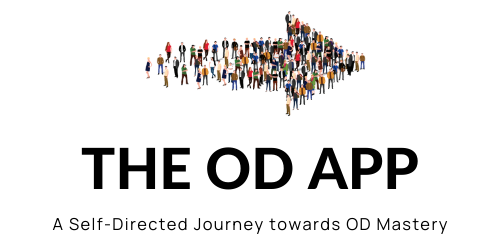Description
As a field, OD is working with dynamic and evolving human systems. This means that the OD Theory and Practice competence necessarily informs every aspect of an effective OD practitioner’s work. In many respects, OD is the application of various behavioural science and related theories to the complexities of human behaviour and organisation behaviour.
It is thus through the lens and framework of sound theory and corresponding research that a competent OD practitioner observes and analyses client situations, designs appropriate interventions, and adapts in real time to emerging challenges and opportunities. The conceptual anchor of sound theory supports the practitioner as they navigate the ‘messiness’ of organizational life. The theoretical lens provides a robust way to work confidently with the complexity of system dynamics.
Moreover, as with any living field of study and applied science, the theory and practice of OD is in no way static. There is a constantly growing body of literature informing an ever more robust conversation among academic researchers and practitioners—a conversation with which fully competent OD practitioners seek to engage and from which they are always learning.
A non-exhaustive list of core OD-relevant theory sets includes at least the following:
- System Theory
- Action Research Theory
- Change theories
- Social Constructionism
- Appreciative Inquiry
- Complexity and Chaos theories
- Human Systems Dynamics (HSD)
- Dialogic OD theory
- Social Discourse theory
(as noted in Organizational Development: A Practitioner’s Guide for OD and HR, by Mee-Yan Cheung-Judge)
Each of these nine theory sets represents a diverse, multi-layered and continually evolving field of study. The goal for a competent OD practitioner is not so much the destination, but the learning journey, building their practice on as firm a foundation of solid theory as possible in the service of their clients, whether external or internal. Of course, there are also a growing number of “working theories” that emerge from the practice experience of individual practitioners.
Experienced by clients
Clients experience four benefits from OD work that is rooted and nourished by sound theory. Firstly, they are helped to feel at ease, to have confidence that the OD interventions proposed and carried out, far from being arbitrary, have been crafted within carefully considered theoretical frameworks. Secondly, clients come to trust the OD processes, benefiting from cumulative academic and research work within the discipline to guide effective and productive interventions. Thirdly, with clear theoretical frameworks, clients can be educated and equipped to develop effective OD skills within their own organisations. Finally, clients gain insights into their own systems, growing in their appreciation and understanding of the dynamics at play, as well as expanding their own abilities to effect positive organizational change.
What the competence ‘looks like’
The characteristics and qualities noted below are not intended to be exhaustive or definitive. Nor are they in any particular order. Nor are the distinctions between ‘Knowledge’, ‘Skills/Abilities’ and ‘Character/Attitude’ hard and fast—rather they are heuristic categories with obviously overlapping edges. The intention is merely to provide a frame of reference for considering important elements of the OD Theory and Practice competence.



